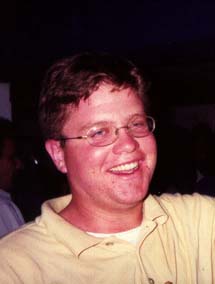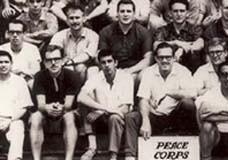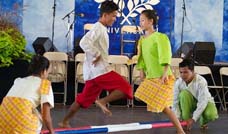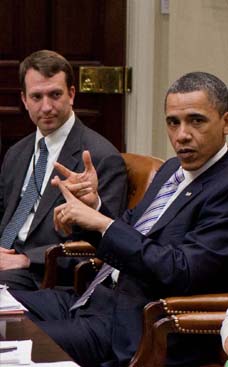
The Poiriers received little information about their son's disappearance from the Peace Corps or Bolivian officials. The FBI got involved following a letter sent to then-Attorney General John Ashcroft by Sens. John Kerry and Edward Kennedy and U.S. Rep. Marty Meehan, requesting their assistance. Kerry, Kennedy and Meehan also were instrumental in helping the Poiriers push to prevent the Peace Corps from removing Wally from its active roster. "I never want them to forget him and that he did not come home," Walter Poirier says. There are many theories about what happened to Wally. "My gut instinct was always that something bad happened," Skelly says. "Wally did not feel safe there (in the Zongo Valley) and he asked a lot of questions. Maybe he asked the wrong questions of the wrong people." In 2004, a 22-year-old Bolivian man told authorities that he was kidnapped by two employees at an electric plant after overhearing them say they had killed and buried Wally Poirier in a mountain pass. A formal complaint was filed, but the men were never charged. In September 2007, then-Peace Corps Inspector General David Kotz led a 27-person expedition that included FBI agents and Rhode Island State Police cadaver-sniffing dogs. Bones and clothing were discovered, but did not match to Sheila Poirier's DNA. "A lot of time had passed between when he had gone missing and that expedition," Walter Poirier says. "A few years earlier, torrential rains had washed everything off of the mountain. I would like to think he did fall; we would hate to think he died as the result of foul play." Meehan, now chancellor at University of Massachusetts Lowell, says he still thinks about Wally a lot. "You can't really have closure on something like this when you don't know what happened," he says. "I was struck in this case that the leadership of the Peace Corps wasn't as alarmed as those of us who were trying to find out what happened to Walter were."
Fate of Peace Corps volunteer Walter Poirier still a mystery
Peace Corps volunteer's fate a mystery
By Jennifer Myers, jmyers@lowellsun.com
Posted: 03/06/2011 06:37:31 AM EST
LOWELL -- The villagers warned him not to go. It was Feb. 3, 2001, the height of the Bolivian rainy season. Peace Corps volunteer Walter Poirier, working to boost eco-tourism in the South American nation's Zongo Valley, attended a community meeting in the small village of Coscapa, 11,500 feet above sea level and 26 miles north of the capital La Paz.
At the end of the meeting, the natives advised the 22-year-old American against heading up the steep, treacherous mountain pass in the torrential rain. The aqueduct trail, which in places drops 50 to 100 feet off the side of the mountain, would surely be flooded.
Investigators believe Poirier went anyway, headed toward the village of Liaullini, where there was a schoolhouse where he kept a sleeping bag.
He vanished.
A decade has passed since Walter and Sheila Poirier last saw their eldest son. The pain, still fresh, has dug creases in Walter Poirier's face. Those creases grow deeper as he shows a visitor a framed photo of his son in the family's TV room.
Wally, a 1996 graduate of Lowell High School, missed his younger sister Danielle's wedding last year. He missed seeing the Red Sox win the World Series, twice. He missed his little brother Christopher's high school graduation.
"It took a toll on the family," says Walter Poirier, his eyes welling. "There have been some difficult times."
Walter Poirier, chief assessor in Leominster, feels the loss every day. But he also feels anger. Anger at the Peace Corps, the service organization his son joined after graduating from the University of Notre Dame in 2000 to make a difference in the world; the organization whose negligence, Poirier says, led to his son's disappearance.
"He had been gone for a month before anyone noticed he was gone," he says. "We had to notice; the Peace Corps had no clue. There was improper supervision."
Sheila Poirier spent 10 days searching for her son in Bolivia and conducting a media blitz for information in the summer of 2001. She politely declines to speak about the son she lost.
His name was Knapsack. Sven Knapsack. Sven, a young man from Norway, popped up among other Lowell High School students during a trip to a national Mock Trial competition in Indiana.
Sven asked a stranger in an elevator if he had seen his yak; he invited women on the beach to join him at the yak festival in his hometown.
Sven looked suspiciously like Wally Poirier, who never broke character the entire week.
"He was so funny," says Lowell High friend Susan McMahon, a former Lowell Sun reporter now working as a lawyer in Washington, D.C.
"I hate saying 'was.' It really sucks," she says. She grows quiet as soon as the words leave her mouth.
"Wally was definitely a unique character," high school friend Matt Steinberg says. "He had the kind of sense of humor that sometimes could get under your skin. It wasn't mean-spirited, just mean to keep you on your toes and poke at you a bit.
"He would do anything for you, and kept us all grounded," Steinberg adds. Steinberg, a Methuen High School history teacher, has integrated Wally's story into the curriculum, during his lesson on President John F. Kennedy and the creation of the Peace Corps.
Beyond his gregarious, somewhat sophomoric side there was a deep maturity to young Wally Poirier, McMahon notes. He had a keen insight into what made people tick, had a big heart and was drawn to community service, friends say.
No one was surprised when he joined the Peace Corps.
"Notre Dame helped to foster a sense of community, a sense of service in him," Walter Poirier says. The education he got there was tremendous and the moral fiber they instilled was tremendous."
Wally was in a bar with friends in South Bend, Ind., shortly after finding out that he was headed to Bolivia with the Peace Corps. By chance, he met students from Bolivia that night; he had never met anyone from Bolivia before.
"He figured it was fate," Walter Poirier recalls. "That sealed the deal for him."
Wally Poirier arrived in Bolivia in August 2000. Following three months of training, he was sworn in on Nov. 7, 2000. His assignment: Work with the natives to craft strategies to boost tourism in the rural Zongo Valley, two hours from La Paz.
He lived in a small, white cottage with running water and a radio, but no telephone. He could only be reached by calling one of the nearby hydroelectric plants. Cell phones did not work in the isolated, mountainous region and satellite phones were not provided to Peace Corps volunteers.
Wally spent a lot of time in La Paz, at a "crash pad" where many Peace Corps volunteers stayed.
"It was Wally and 12 girls," recalls Lupine Skelly, now a retail analyst in New Mexico, who was a Peace Corps volunteer in Bolivia at the same time. "He was much loved by the girls. We had a lot of girlie things in the crash pad like candles and stuff, so he had his "man wall" downstairs where he hung up Sports Illustrated and funny guy stuff."
Wally would call or e-mail his parents every few weeks. He called during the last week of January 2001 from La Paz to tell them he was heading out to the Zongo Valley.
A few weeks went by. Sheila Poirier became nervous. It was unlike Wally to go so long without calling or sending an e-mail. At 10:49 a.m. on March 4, 2001, Sheila Poirier called the La Paz crash pad. She was told by another volunteer that Wally had not been seen for weeks.
She immediately called the Peace Corps' 24-hour hot line. On March 6, his sister Danielle's 21st birthday, Wally Poirier was officially declared missing.
A search of the room Wally rented in the Zongo Valley found his wallet, which contained 90 Bolivianos (about $12), an American Express card, an ATM card, a phone card, his Peace Corps identification, his Bolivian credentials, his Massachusetts driver's license, Social Security card and a copy of his passport.
They also found two receipts from shops in La Paz dated Jan. 31. It had been more than a month; the trail was cold.
Stephen Spaulding, a 23-year-old Northwestern University graduate from Minnesota, met Wally on the airplane to Bolivia. The rookie Peace Corps volunteers quickly formed a strong friendship.
Spaulding says that when he became ill with E. coli poisoning, Wally was the only person who visited him every day in the Bolivian hospital.
When he heard Wally was missing, Spaulding was one of the first to join the search team. He wore the striped, earth-toned alpaca wool sweater, hand-woven by Bolivian artisan women, which had been Wally's. Sheila Poirier gave it to Spaulding as a gift.
Today, 10 years later, Spaulding, now a marketing executive for Conagra Foods, still wears his lost friend's sweater.
"It is something for me that keeps his memory alive," he says, his voice cracking. "What makes me so sad, on a personal level is that I know Wally was going to be one of those friends I would have for a lifetime, the friend who was supposed to be the best man at my wedding. He was supposed to be that enduring friend."
The Poiriers received little information about their son's disappearance from the Peace Corps or Bolivian officials. The FBI got involved following a letter sent to then-Attorney General John Ashcroft by Sens. John Kerry and Edward Kennedy and U.S. Rep. Marty Meehan, requesting their assistance.
Kerry, Kennedy and Meehan also were instrumental in helping the Poiriers push to prevent the Peace Corps from removing Wally from its active roster.
"I never want them to forget him and that he did not come home," Walter Poirier says.
There are many theories about what happened to Wally.
"My gut instinct was always that something bad happened," Skelly says. "Wally did not feel safe there (in the Zongo Valley) and he asked a lot of questions. Maybe he asked the wrong questions of the wrong people."
In 2004, a 22-year-old Bolivian man told authorities that he was kidnapped by two employees at an electric plant after overhearing them say they had killed and buried Wally Poirier in a mountain pass. A formal complaint was filed, but the men were never charged.
In September 2007, then-Peace Corps Inspector General David Kotz led a 27-person expedition that included FBI agents and Rhode Island State Police cadaver-sniffing dogs. Bones and clothing were discovered, but did not match to Sheila Poirier's DNA.
"A lot of time had passed between when he had gone missing and that expedition," Walter Poirier says. "A few years earlier, torrential rains had washed everything off of the mountain. I would like to think he did fall; we would hate to think he died as the result of foul play."
Meehan, now chancellor at University of Massachusetts Lowell, says he still thinks about Wally a lot.
"You can't really have closure on something like this when you don't know what happened," he says. "I was struck in this case that the leadership of the Peace Corps wasn't as alarmed as those of us who were trying to find out what happened to Walter were."
A July 2001 report issued by the U.S. General Accounting Office, the investigative arm of Congress, concluded, "the Peace Corps failed to properly supervise Mr. Poirier and lost track of him."
More than 200,000 young Americans have volunteered for service with the Peace Corps since its inception in 1961; 279 have died in service.
Wally Poirier is its only volunteer reported missing and never found.
"I lost a great person, we all lost a great person, but along with the grief there is also a lot of anger there," McMahon says. "Things were not handled particularly well and we should have some answers; at this point it seems we will never have any answers and that makes me very angry."
Coming tomorrow: A look at the criticism leveled at the Peace Corps for its handling of the Poirier case.
















